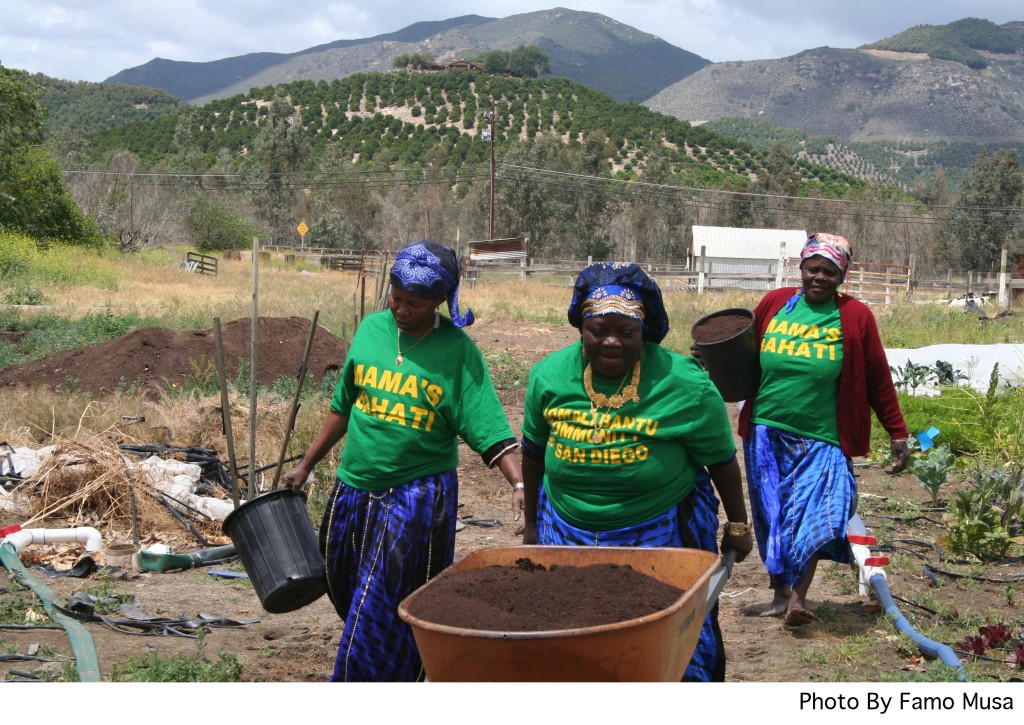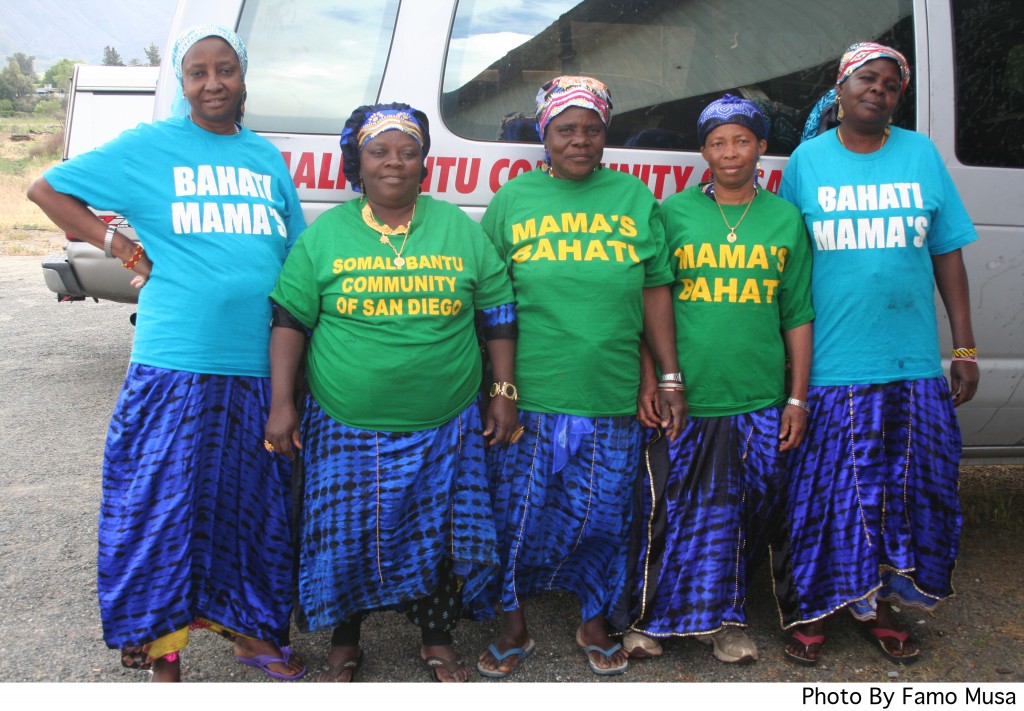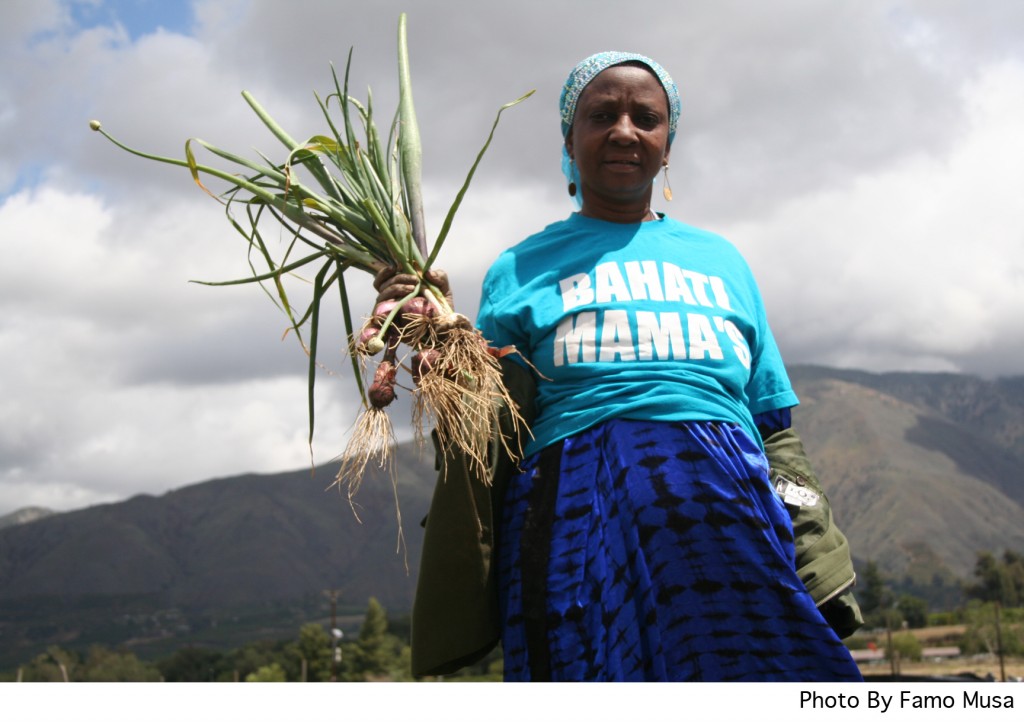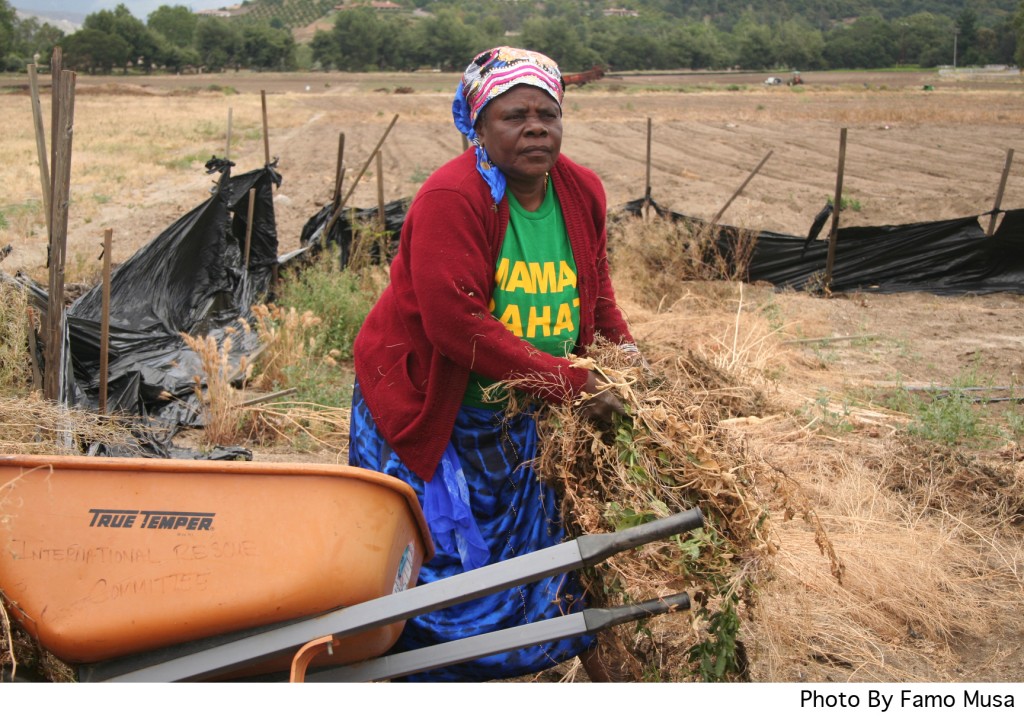
The Bahati Mamas, (front to back), Sitey Mbere, Hawa Ahamed and Maganey Ramazani, are transporting soil to a field at the Tierra Miguel farm in Escondido to prepare for the summer season. | Photo Credit: Famo Musa, The AjA Project
Binti Musa is a high school student and member of The AjA Project’s Youth Advisory Council.
The Bahati Mamas are a group of five Somali Bantu women living in City Heights who started their own farming business. The women are refugees who were forced to leave their homes in 2004 to seek refuge in the United States because of the civil war in Somalia.

The Bahati Mamas – Hajia Kangame, Sitey Mbere, Maganey Ramazani, Hawa Ahamed and Khadija Musame – are a group of five Somali Bantu refugees living in City Heights who started their own farming business in 2009. | Photo Credit: Famo Musa, The AjA Project
The Somali Bantu refugees had to leave everything they knew. As part of their resettlement, the International Rescue Committee (IRC) helped the refugee families find jobs, learn English and help their children get an education. The refugees faced many challenges while learning American customs; one of these challenges was finding quality organic produce for the families in their community. This served as an impetus for the Somali Bantu community to begin farming like they did in their old homes.
The Somali Bantu community went to the IRC for help to find land where they could produce their own food. As a result, in 2007 refugees in City Heights received a small plot of land on 54th Street at Chollas Parkway called the New Roots Community Garden.
At this time the Bahati Mamas began selling their produce for extra income and in 2009 they started their own organic produce farming business. For the past five years the Bahati Mamas have sold their produce locally – mainly at the City Heights Farmers Market.
“All our produce is organic,” said Sitey Mbere. “We would like to put our produce in local schools so our children can get healthy food.”

Bahati Mama Hajia Kangame is holding onions she harvested from the spring crop. | Photo Credit: Famo Musa, The AjA Project
“We are lucky to live in a place like San Diego that reminds us of our homeland,” said Hawa Ahamd. The Somali Bantu women live in City Heights and say they will never leave the area.
Once they outgrew their space at the New Roots Community Garden in City Heights, the Bahati Mamas acquired an additional piece of land in Escondido, California through the IRC. It’s called the Tierra Miguel Farm. The IRC facilitates renting the plot for the women. The Bahati Mamas pay a monthly fee to farm the land and sell their fresh, organic produce to local markets.

One of the Bahati Mamas, Maganey Ramazani, is cleaning brush and leaves from the spring season in preparation for the summer season at the Tierra Miguel Farm in Escondido, California. | Photo Credit: Famo Musa, The AjA Project
With the help of organizations such as the IRC, the Bahati Mamas created a successful business from a simple idea. The strong group of Somali Bantu women continues to inspire their families, friends and peers as leaders in their community.
The Bahati Mamas go to Tierra Miguel every Saturday and Sunday from the early morning to the late afternoon. They use the Somali Bantu community van for transportation and it takes them more than an hour to drive each direction.
“We pay for gas and pay the driver as a thank you for helping with transportation, but our goal is to get our own van with [the Bahati Mama’s] logo someday,” said Mbere.
In 2010, First Lady Michelle Obama came to the New Roots farm to speak about the importance of eating healthy and show her support for urban gardens. The Bahati Mamas said they are happy that the First Lady supports healthy food. They said they hope the president will come visit the community garden, as well, because as they say jokingly, “He’s our brother.”
The Bahati Mamas hold on to their old traditions but said they believe America has given their families more opportunities then they had in Somalia.
The Bahati Mamas have plans to expand their business and hope to gain continued recognition and support from other community-based organizations in the process.
“We want everyone to know who the Bahati Mamas are and who the Somalia Bantu [refugees] are,” said Maganey Ramazani. Although they are proud of the work they have accomplished, the Bahati Mamas say this is just the beginning.
Local residents may purchase fresh, organic produce from the Bahati Mamas at the IRC booth at the City Heights Farmers Market from 9 a.m. to 1 p.m. Saturdays. Their produce is also available at local grocers and restaurants.

